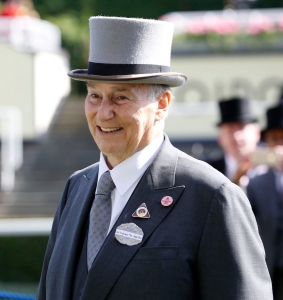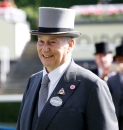Note: Audio is placed below the main text, when available.
The Aga Khan looking to win his first Eclipse with Vadeni 2022-06-29
By supplementing his impressive Prix du Jockey Club winner Vadeni for Saturday’s race, the Aga Khan has the opportunity to win the Eclipse Stakes for the first time. In his many years as owner and breeder, the Aga Khan has won all of Britain’s other top all-aged middle-distance races - the Coronation Cup, Prince of Wales’s Stakes, King George, Juddmonte International and Champion Stakes - at least once, but never the Eclipse.
The closest he came to winning it was in 2000 when his Sir Michael Stoute-trained four-year-old Kalanisi lost out by a head in a memorable finish to three-year-old Giant’s Causeway. The Aga Khan has, however, bred an Eclipse winner. Two years earlier it was won by Daylami, by then racing for Godolphin, but who’d won the previous season’s Poule d’Essai des Poulains in the colours of his breeder to whom he returned for stallion duties when his racing days were over.
Last year’s Eclipse was another good result for the Aga Khan because St Mark’s Basilica, who also went to Sandown after winning the Prix du Jockey Club beforehand, is by another Aga Khan stallion Siyouni.
This year, the Aga Khan Studs are celebrating ‘A Centenary of Success’ going back to the days of the current Aga Khan’s grandfather who had his first winner in England when his two-year-old filly Cos won the 1922 Queen Mary Stakes on her debut. Later second in the 1000 Guineas, Cos became a successful broodmare, producing the first of three Eclipse winners for Aga Khan III. That was the 1930 winner Rustom Pasha who also won that season’s Champion Stakes.
The Aga Khan’s next Eclipse winner was Migoli in 1947, a great grandson of another of his early yearling purchases Mumtaz Mahal, a brilliantly speedy filly on the track and later a hugely influential broodmare – Shergar and Zarkava are just two of the current Aga Khan’s best horses who were direct descendants of hers. Migoli also won the Champion Stakes and, a year later, became the first British-trained horse to win the Prix de l’Arc de Triomphe.
Then came Tulyar, rated Timeform’s best horse of 1952 with a rating of 134. As well as the Eclipse, his wins that year included the Derby, King George and St Leger which, for a time, gave him record earnings for a British-trained horse. Despite that, it wasn’t long afterwards that his owner decided to move his string to France to take advantage of better prize money.
Therefore, when Tulyar’s half-brother Saint Crespin also won the Eclipse seven years later in 1959, he did so for the Chantilly stable of Alec Head who died at the age of 97 just over a week ago. Following the Aga Khan’s death in 1957, his bloodstock passed to his son Prince Aly Khan who enjoyed a remarkably successful year in 1959. Saint Crespin went on to win the Arc but his owner had an even better horse that year, the top-class filly Petite Etoile who won the 1000 Guineas and Oaks. Tragically, though, Prince Aly was involved in a fatal car crash in Paris just a year later. A win for Vadeni on Saturday would therefore mean that the current Aga Khan would become the third generation of his family to win the race.
Despite the long history of the Aga Khan Studs, Vadeni’s family is a relatively recent addition to his owner’s bloodstock dating back less than 20 years and his pedigree owes at least as much to Jean-Luc Lagardere. Another of France’s most successful owner-breeders, Lagardere died in 2003 and, in the spring of 2005, his entire bloodstock operation comprising 222 horses in total was bought by the Aga Khan.
Among the horses in the package was Linamix, the stallion to whom Lagardere owed much of his success, and no fewer than 62 mares. The 74 horses in training included the then unraced three-year-old filly Vadawina who would become Vadeni’s grandam. In fact, Vadawina became one of the first horses from the Lagardere intake to win in the Aga Khan colours, making a winning debut at Saint-Cloud just weeks after the transfer. An easy winner of her next two starts as well, the Prix Cleopatre and Prix Saint-Alary (both under Christophe Soumillon who will be partnering her grandson again on Saturday), Vadawina looked a potential classic winner but sustained a career-ending leg injury when finishing fourth in the Prix de Diane. Vadawina’s half-sister Vazira also won the Saint-Alary, in 2014, having later been awarded the race after passing the post in second.
When the Aga Khan acquired the Lagardere horses, he kept those in training with their existing trainers, and while Andre Fabre (Vadawina’s trainer) is no longer on the Aga Khan’s roster of trainers, the association has been maintained ever since with Jean-Claude Rouget who trains Vadeni.
Vadeni isn’t the first French classic winner Rouget has handled from the wider family since it passed into the Aga Khan’s hands. He also trained the ill-fated 2012 Prix de Diane winner Valyra who was unbeaten in three starts when winning at Chantilly but sadly couldn’t be saved when breaking a leg at exercise later that summer. Valyra, incidentally, was out of Valima, the Aga Khan’s very first winner from the Lagardere intake when winning the Prix Imprudence just days after the purchase took place.
One of the best horses from Vadeni’s family was the high-class Valixir, a son of Vadeni’s great great grandam Vadlamixa. Valixir had run in the Lagardere colours at three, finishing a close third in the Prix du Jockey Club (the final time it was run over a mile and a half) and winning the Prix Niel before contesting the Arc. But Fabre dropped him in trip at four when he became the best horse in the batch acquired by the Aga Khan that season. In fact, he completed a Group 1 double for his family, and his connections, when winning the Prix d’Ispahan at Longchamp on the same day that Vadawina won the Saint-Alary. He followed up by beating Rakti and Starcraft in the Queen Anne Stakes when Royal Ascot took place at York that year.
Jean-Luc Lagardere had a similar policy to the Aga Khan when it came to naming his horses, using the same letter for all family members, and while that provides some continuity in Vadeni’s pedigree, the proliferation of horses in the family beginning with a ‘V’, many of them with similar names, can be a little confusing!
They all trace back to an American-bred mare named Vadsa – Vadeni’s sixth dam - who raced for Lagardere in the early-1980s. She won only one of her 12 starts but became a prolific broodmare, with all bar one of her 14 foals proving successful. Vadsa became grandam of Lagardere’s Vahorimix who was awarded both the Poule d’Essai des Poulains and the Prix Jacques le Marois, while another of her grandsons was Val Royal who contested the Derby in Lagardere’s colours but had been sold to American connections by the time he won the Breeders’ Cup Mile later in his career.
Interestingly, there’s a connection with the current Aga Khan’s grandfather’s first Eclipse winner further back in the pedigree. Vadsa has some Argentinian mares on the bottom line of her pedigree, including one named Rustom’s Legend. As that suggests, she was a daughter of Rustom Pasha whose stallion duties eventually took him to South America.
- 2677 reads
Images
Recent Articles
The Aga Khan looking to win his first Eclipse with Vadeni 2022-06-29
Posted June 29th, 2022 by librarian-hdBy supplementing his impressive Prix du Jockey Club winner Vadeni for Saturday’s race, the Aga Khan has the opportunity to win the Eclipse Stakes for the first time. In his many years as owner and breeder, the Aga Khan has won all of Britain’s other top all-aged middle-distance races - the Coronation Cup, Prince of Wales’s Stakes, King George, Juddmonte International and Champion Stakes - at least once, but never the Eclipse.
- Read more
- 1145 reads
All Related Articles
| News Article |  | The Aga Khan looking to win his first Eclipse with Vadeni 2022-06-29 | sportinglife.com |
 Ismaili.NET - Heritage F.I.E.L.D.
Ismaili.NET - Heritage F.I.E.L.D.



